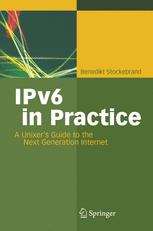

Most ebook files are in PDF format, so you can easily read them using various software such as Foxit Reader or directly on the Google Chrome browser.
Some ebook files are released by publishers in other formats such as .awz, .mobi, .epub, .fb2, etc. You may need to install specific software to read these formats on mobile/PC, such as Calibre.
Please read the tutorial at this link: https://ebookbell.com/faq
We offer FREE conversion to the popular formats you request; however, this may take some time. Therefore, right after payment, please email us, and we will try to provide the service as quickly as possible.
For some exceptional file formats or broken links (if any), please refrain from opening any disputes. Instead, email us first, and we will try to assist within a maximum of 6 hours.
EbookBell Team

4.4
52 reviewsHandling IPv6 for the first time is a challenging task even for the experienced system administrator. Even though IPv6 is in many ways simpler, more reliable, and easier to operate than today’s IPv4, its new concepts and mechanisms make it necessary to rethink a number of well-established methods and practices.
This book is a practical guide to IPv6 addressing Unix and network administrators with experience in TCP/IP(v4) but not necessarily any IPv6 knowledge. It focuses on reliable and efficient operation of IPv6 implementations available today rather than on protocol specifications. Consequently, it covers the essential concepts - using instructive and thoroughly tested examples - on how to configure, to administrate, and to debug IPv6 setups. These foundations are complemented by discussions of best practices and strategic considerations aimed at overall efficiency, reliability, maintainability, and interoperation.
The examples in this book cover all technologically relevant aspects concerning Debian GNU/Linux, FreeBSD, and Solaris. Examples about other Unix derivatives are available online at www.benedikt-stockebrand.de.